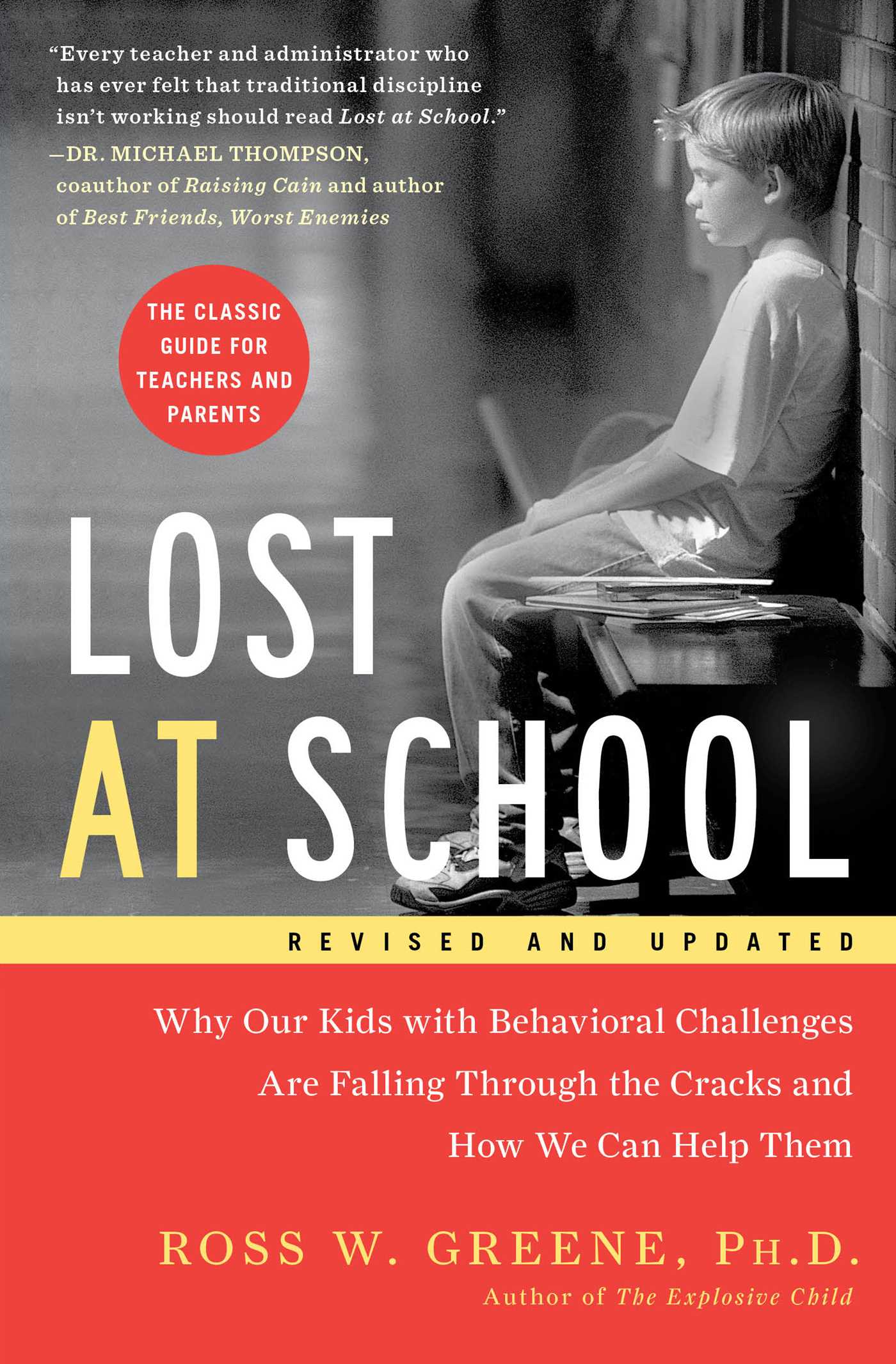I wrote Lost at School because a lot of educators were telling me they wanted a book on Collaborative & Proactive Solutions that was specially geared toward the problems they face in school...and the colleagues who were still stuck in old ways of thinking about school discipline. It's had an impact on discipline practices in many schools...just not enough of them just yet. - RG
Lost at School
Excerpt:
The wasted human potential is tragic. In so many schools, kids with social, emotional, and behavioral challenges are still poorly understood and treated in a way that is completely at odds with what is now known about how they came to be challenging in the first place. The frustration and desperation felt by teachers and parents is palpable. Many teachers continue to experience enormous stress related to classroom behavior problems and from dealing with parents, and do not receive the support they need to help their challenging students. Half of teachers leave the profession within their first four years, and kids with behavioral challenges and their parents are cited as one of the major reasons. Parents know there’s trouble at school, know they’re being blamed, feel their kids are being misunderstood and mistreated, but feel powerless to make things better and are discouraged and put off by their interactions with school personnel.
School discipline is broken. Not surprisingly, tightening the vise grip hasn’t worked. A task force of the American Psychological Association has recently concluded that zero-tolerance policies, which were intended to reduce violence and behavior problems in our schools, have instead achieved the opposite effect. A review of ten years of research found that these policies have not only failed to make schools safe or more effective in handling student behavior, but have actually increased behavior problems and dropout rates. Yet public elementary and secondary schools in the United States continue to dole out a whopping 110,000 expulsions and 3 million suspensions each year, along with countless tens of millions of detentions.
Behind the statistics, behind each expulsion, suspension, and detention, are human beings—kids, teachers, parents—doing the best they can with the tools they have. Dramatic changes are needed to help them. And my experience suggests that these changes won’t be as painful and difficult as many fear. We cannot keep doing things the way we always have and continue losing kids on a scale that is truly astounding. This book is about doing things a different way.
I interact with hundreds of challenging kids every year. These kids would like nothing better than to be able to handle the social, emotional, and behavioral challenges being placed on them at school and in life, but they can’t seem to pull it off. Many have been getting into trouble for so long that they’ve lost faith that any adult will ever know how to help them. I work with hundreds of teachers every year, too. The vast majority care deeply about kids and devote massive amounts of time and energy to the kids they teach. But most readily acknowledge that understanding and helping challenging kids wasn’t a major part of their education, and that they could use some serious help with some of these students and their parents. And most are so caught up in the daily demands of teaching and all the new initiatives imposed on them that they simply don’t have time to reflect on how to better help the challenging kids in their classrooms.
I also work with hundreds of parents of challenging kids every year. Most are eager to work with school personnel in addressing their kids’ challenges in an effective and compassionate way, but they aren’t exactly sure how to make it happen.
Helping kids with social, emotional, and behavioral challenges is not a mechanical exercise. Kids aren’t robots, adults aren’t robots, and helping them work together isn’t robotic. The work is hard, messy, uncomfortable, and requires teamwork, patience, and tenacity, especially as the work also involves questioning conventional wisdom and practices…
This book is not about academics. There are plenty of initiatives in the field of education to make sure kids get what they need academically. This book is about the kids those initiatives inexplicably left behind.
This book does not bash or blame educators. Nor, for that matter, does it bash or blame challenging kids or their parents. It’s about the need to make dramatic changes in a system that isn’t working for teachers, parents, or challenging kids, and how to go about making those changes. Three massive shifts are required: (1) a dramatic improvement in understanding the factors that set the stage for challenging behavior in kids; (2) creating mechanisms for helping these kids that are predominantly proactive instead of reactive; and (3) creating processes so people can work on problems collaboratively.
Different people will take different things from this book. For some, the fact that challenging behavior can be traced back to lagging cognitive skills will be quite novel. For others, the limitations of consequences could be an eye-opener. For still others, the specific ingredients involved in solving problems collaboratively, and how these ingredients differ from (and are often more productive than) other ways of talking with and caring about challenging kids, will be enlightening. And for still others—perhaps those who have become a bit jaded or cynical—this book may offer a fresh perspective and new hope.
Reviews:
If you are a real teacher (or principal or dean) in a real school, this humane and engaging book will surprise you with its combination of practicality and idealism. It will inspire you to change things and to believe in the possibility of change. After teaching for eight years, I have spent the last three as "the discipline guy", Dean of Students, in a small, rural middle school. As both teacher and now as dean I have developed a deep suspicion of a certain sort of books. You know the ones: written by theoreticians or one-on-one therapists who have never had to juggle a roomful of 25 actual young human beings with not enough time, not enough resources and far too much of paperwork, testing, and ringing bells; and more and more deeply-troubled youngsters. These are the books that anxious or angry and frustrated parents bring to meetings that tell them how you should be meeting the needs of their unsuccessful or disruptive child. These books make things far worse for everyone involved. "Lost at School" is different; and that's clear from the beginning. After a brief introduction -- which pulls no punches in saying "school discipline is broken" -- the book launches into a story! Every teacher I know likes a good story - and this one feels so much like real (school) -- life from the beginning that it sets the hook for the rest of the book. The different thing about this story is not the characterization of the troubled and challenging kids, but of its inclusion of the realistic range of adult personalities that combine to make education what it is, and sometimes isn't.
Amazon reviewer
Please read this book! I couldn't put it down. It encouraged me and helped me step back so that I could get a fresh outlook with my children's motivations and struggles. If you are struggling with behavioral issues in your classroom or at home and have ADHD students or students with other behavioral issues, I believe this book will encourage you. This book is geared toward educators, but I believe it would also be very valuable and helpful for parents who have children with behavioral challenges to understand why their children are struggling in school and what can be done to help them. The premise of this book is that traditional methods of rewards and consequences are not effective with students with behavioral problems. So, we are faced with the question, "What do we do now?" The author's answer is that we need to discard the labels of things like Bipolar and ADHD and look more deeply at the skills students are lacking--emotional and intellectually. We, as parents and teachers, need to equip students so that they can cope. There is an inventory/questionnaire at the back of the book called the ALSUP, which is a great tool to help you pinpoint your child/student's struggles. The book focuses on the philosophy behind this list of skills and then how to implement strategies to address the student's/child's needs. The author does a great job of giving examples that illustrate his points. I highly recommend this book! Many books written for educators are very dry and hard to get through. On the other hand, this book is interesting and thought provoking throughout!
Amazon reviewer
I was very surprised and impressed by this book. It takes a simple premise, that kids who struggle behaviorally because they are lacking critical cognitive skills, and explains it in a very straightforward manner, giving you everything you need and more to understand it. At the end of each chapter is a Q&A section where the author answers probable reader questions and compares his theory to other popular psychological and educational models, as well as a story that shows the process in action. While the story is a little cheeky, it does its job well, and it makes for a more compelling read. Overall, this is one of the best books I've read on dealing with troubled students, and it's a method that I'll definitely be trying in my classroom in the weeks and months to come.
Amazon reviewer
No one in America has thought more deeply about the problems of disruptive children in school than Ross Greene. In this brilliant book, he goes inside the minds of children and school personnel to explain why old-fashioned school discipline and zero-tolerance policies have failed. Then he offers original and tested new strategies for working with the most behaviorally challenging children. Every teacher and administrator who has ever felt that traditional discipline isn’t working should read Lost at School.
Dr. Michael Thompson, coauthor of Raising Cain, and author of Best Friends, Worst Enemies
We cannot ignore difficult student behaviors any longer. Dr. Greene’s book is a timely contribution to the literature on how schools must support all students, and his approach fits well with Response to Intervention (RTI).
Rachel Brown-Chidsey, Ph.D., NCSP, associate professor, School Psychology Program, University of Southern Maine, and coauthor of Response to Intervention

